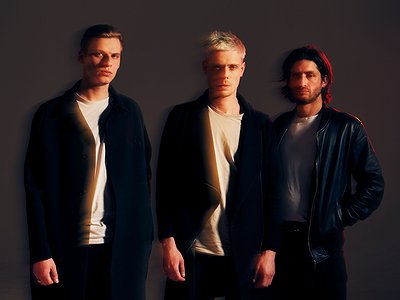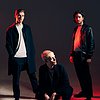Name: Cook Strummer
Nationality: Belgian
Occupation: Producer, Songwriter
Current Release: The Fall on LOK Recordings
Recommendations: I love Bernard Werber, the french writer. I would recommend The Thanatonauts. He used to be a journalist for a big french newspaper back then and wrote a well documented article about near death experiences. The article has been replaced last minute by an article about fashion. He left his job and wrote this book, about experimenting afterlife. Truly fascinating.
A piece of music would be Chopin's Nocturnes. There is all the possible lyricism in there. Emotions, passion and honesty.
Website / Contact: If you enjoyed this interview with Cook Strummer, visit his website or facebook account for music, tour dates and background information.
When did you start writing/producing music - and what or who were your early passions and influences? What what is about music and/or sound that drew you to it?
As far as I remember, I have always been surrounded by music and instruments. My father is a guitarist, my mom a professional dancer, and my brothers also musicians. My grandma played a big role in the early stages of my musical path. She was always singing her own songs in french, playing guitar and piano. She is a true story teller. I used to be fascinated by the power of her songs. It was simple, but enough to make me travel.
My father gave my brothers and me the basic musical background: The Clash, The Beatles, Bowie, Pink Floyd, Led Zeppelin, Genesis … There was always music at home.
When I was around 12 years old I started listening to electronic music. My uncle gave me a tape from “I Love Techno 99“ with some Jeff Mills & Laurent Garnier and I got my first Synthesizer / Groove Keyboard, a Roland EG-101. Enough to learn squeezing knobs and experiment. At the same time, I started to be fascinated by bands like Nirvana, Radiohead, Blur or The Red Hot Chili Peppers. I realised later on that I was fascinated by the personas of charismatic artists like Kurt Cobain or John Frusciante. I wanted to be like them. But soundwise I wanted to make something different.
So I started a band with some friends and then with my two brothers. At that time I have learned how to record in studios. How to compose and put live instruments together. It stuck till the golden revival rock era in the years 2000’s. Back then I was heavily influenced by The Strokes - “Is this it“ was a revelation - Kings of Leon (the two first albums) and The Libertines.
In the meantime I did keep a foot in the electronic scene, that I have always considered as the only underground scene where everything was possible. Late 2000’s beginning 2010’s I started getting more and more into techno raves and clubs in Brussels (Fuse, Wood, Mirano …)
The Electro scene of the late 2000’s was a very interesting time (Boys Noize, Digitalism, Justice …) Because it was the first time I could feel a real bond between the electronic music scene and the rock scene. It was like having live music shows in clubs. In the meantime, Radiohead released “In Rainbows”, which changed my perception of music forever.
During the minimal era, when Berlin started to take over the electronic music scene (more or less 7-8 years ago) I was out every weekend. Artists like Max Cooper, Ellen Allien or Dafni (Caribou) did influence my path for sure.
I started properly producing as a “bedroom producer” when I decided to move to Berlin early 2013. It was truly relieving to discover the infinite possibilities and freedom that Ableton Live has to offer.
For most artists, originality is first preceded by a phase of learning and, often, emulating others. What was this like for you? How would you describe your own development as an artist and the transition towards your own voice? What is the the relationship between copying, learning and your own creativity?
You need to learn from your masters before trying things. A constantly growing musical background allows you to make associations and set up similarities between genres in order to develop your own inner choices. It needs to become intuitive.
I personally love music. I listen to music for at least two hours everyday. From classical music to hip hop, pop, techno, folk, metal … I think an educated musical ear can get inspired by everything. Of course then it is about quality. But well, that is another topic.
What were your main compositional- and production-challenges in the beginning and how have they changed over time?
I used to record my ideas with a K7 tape recorder before going to the studio when I was young. Later, I started producing with Garage Band and then Logic. The challenge back then was to pre-record everything and having it ready before paying a sound engineer and a studio for the final recordings. Nowadays it’s a lot more simple. A computer with Ableton and a good soundcard do the job. Of course a good studio led by a good sound engineer for live recording is important. But I can create most of the final stems at home.
What was your first studio like? How and for what reasons has your set-up evolved over the years and what are currently some of the most important pieces of gear for you?
My first home studio was pretty basic. A bass, a guitar, a Focusrite Saphire, KRK speakers, a Rhode NT2, an AKAI mpk mini and some effect pedals. My setup stayed the same for a few years. Then I started getting gear that improved my comfort, like a faster sound card with more entries, a better microphone, more guitars, some drum machines (Korg Electribe, Korg Volcas, Nord Drum…) But all in all it didn’t change the way I produce.
The most important pieces of gear for me are a soundcard with good preamps and a low latency (i use a Focusrite Clarett 8Pre), my guitar and a good computer. When the drafts are done, I love to plan a proper studio session accordingly to the sound textures i need and can’t record at home (top notch microphones, amplifiers, analog effects, etc.)
At K61 Studio, where I recorded my album, I could truly find the specific sound I wanted with the help of Mario Engelter. We mainly used analog gear in order to create the textures and the organic sounds. It’s a necessity to know what you want before going to the studio. In the studio we used mainly a Moog Sub Phatty for all the subs, a Vox-o-Rama Type 47 which gave the unique crispy sound to the vocals, as mixing desk, an ADT 5MTs (most amazing tube preamps I ever worked with), and concerning the effects, we used a Roland RE-201 Space Echo and a Roland RE-501 Chorus Echo. Those two are my all time fav analog effects.
How do you make use of technology? In terms of the feedback mechanism between technology and creativity, what do humans excel at, what do machines excel at?
I use technology mainly to accelerate the production process. If the basic setup is fast enough, and you experiment enough to find your routines, then the creativity blooms. Machines should stay an extension of humans’ intention in the music creation flow. I am not a big fan of fully automated processes. I find the mistakes quite appealing. I’d even say that mistakes can create a sound footprint, a musical identity.
Production tools, from instruments to complex software environments, contribute to the compositional process. How does this manifest itself in your work? Can you describe the co-authorship between yourself and your tools?
I have a really deep relationship with my guitars. I even sleep with my guitars sometimes. I am a big fan of music instruments. I also love synths (my Moog Sub Phatty is mos def the ultimate keeper). The software is just a platform that allows me to be more efficient and faster. But I must admit that in the last years, I started more and more using plugins. I bought the Soundtoys plugins two years ago, it was the best choice I’ve made for a long time. Organic and intuitive.
But when I compose, it’s mainly live, with drum machines and instruments. All together. I like to design the global vibe, the atmosphere, before recording.



